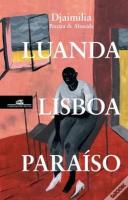 Their story becomes the usual story of many immigrants coming from the old colonies in search of medical treatment or of a better life. In Angola, Cartola was a midwife. In Lisbon, he became a construction janitor, and the city made him indecisive and gloomy. Aquiles, who was still a teenager when he switched country, no longer felt Angolan.
Their story becomes the usual story of many immigrants coming from the old colonies in search of medical treatment or of a better life. In Angola, Cartola was a midwife. In Lisbon, he became a construction janitor, and the city made him indecisive and gloomy. Aquiles, who was still a teenager when he switched country, no longer felt Angolan.
23.12.2018 | by Tatiana Salem Levy
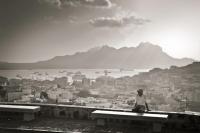 brain drain is a problem. Emigration in Cape Verde is not a bed of roses. In fact, it has created a serious problem of brain drain. One common situation involves young students who decide to study abroad (in Portugal, for example) and do not return to Cape Verde after completion of their university education. According to data between 1997/98 and 2002/2003, about 77% of students (around 5,382) left the country and did not return.
brain drain is a problem. Emigration in Cape Verde is not a bed of roses. In fact, it has created a serious problem of brain drain. One common situation involves young students who decide to study abroad (in Portugal, for example) and do not return to Cape Verde after completion of their university education. According to data between 1997/98 and 2002/2003, about 77% of students (around 5,382) left the country and did not return.
16.12.2018 | by Cláudia Rodrigues
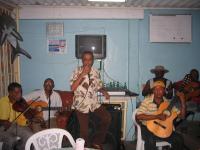 They arrived in Angola 100 years ago. They witnessed the decline of a colonial power that instrumentalized them and the birth of the Angolan nation. The memory of Cape-Verdean immigrants in our country tells a story of oppression and resistance that the creole sociologist Nardi Sousa salvaged and is to publish in a book.
They arrived in Angola 100 years ago. They witnessed the decline of a colonial power that instrumentalized them and the birth of the Angolan nation. The memory of Cape-Verdean immigrants in our country tells a story of oppression and resistance that the creole sociologist Nardi Sousa salvaged and is to publish in a book.
13.12.2018 | by Pedro Cardoso
 Cape Verde is not Africa, Cape Verdeans are “special blacks” and the closest to Portugal. Cape Verde is the country of miscegenation, the “proof” of “racial harmony” of Luso-Tropicalism. For many years, this was the dominant narrative. To be or not to be African continues to be a question.
Cape Verde is not Africa, Cape Verdeans are “special blacks” and the closest to Portugal. Cape Verde is the country of miscegenation, the “proof” of “racial harmony” of Luso-Tropicalism. For many years, this was the dominant narrative. To be or not to be African continues to be a question.
04.12.2018 | by Joana Gorjão Henriques
 In Cape Verde, the sandwich is not making significant inroads. It continues to be foreign, prepared fresh and appreciated by tourists and in a restricted circle of young middle-class professionals. This must be understood within the social and economic context. The following discusses whether or not the sandwich stands a chance in the Atlantic. It looks at the history and current development of Cape Verde, focuses on food issues, and explores how the sandwich fits in.
In Cape Verde, the sandwich is not making significant inroads. It continues to be foreign, prepared fresh and appreciated by tourists and in a restricted circle of young middle-class professionals. This must be understood within the social and economic context. The following discusses whether or not the sandwich stands a chance in the Atlantic. It looks at the history and current development of Cape Verde, focuses on food issues, and explores how the sandwich fits in.
24.11.2018 | by Kaian Lam
 On the contrary, myth derives from oral traditions and has its roots in the fantastic. At the same time, although myth does not need reality to acquire meaning, it does maintain some contact with experience and the world, as a kind of reality-in-disguise.
On the contrary, myth derives from oral traditions and has its roots in the fantastic. At the same time, although myth does not need reality to acquire meaning, it does maintain some contact with experience and the world, as a kind of reality-in-disguise.
12.11.2018 | by Roberto Vecchi
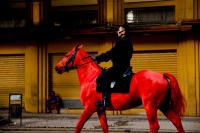 When history and duties to memory are ignored, truth can easily be thought of as a personal choice. Once accommodated in powerful discourse, these “truths” assume impunity: often disregarded and rarely condemned, even though they represent hate speech. Hatred has been normalized and has propelled a radicalism in which “good” struggles against “evil.” In this dichotomy, evil is once again the ‘other’. A discourse that does not humanize the ‘other’ authorizes barbarism – as we have seen in the post-election reactions
When history and duties to memory are ignored, truth can easily be thought of as a personal choice. Once accommodated in powerful discourse, these “truths” assume impunity: often disregarded and rarely condemned, even though they represent hate speech. Hatred has been normalized and has propelled a radicalism in which “good” struggles against “evil.” In this dichotomy, evil is once again the ‘other’. A discourse that does not humanize the ‘other’ authorizes barbarism – as we have seen in the post-election reactions
05.11.2018 | by Fernanda Vilar
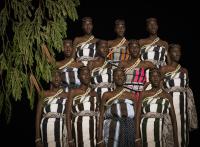 The societies in which we live at different latitudes are legacies of colonialism and constituted by imperial ruins. Depending on our skin colour, social class, academic background and where we live, we can inherit privilege – by benefitting directly or indirectly from the wealth European exploration accumulated – or we can inherit, even accumulate, the oppression of institutional racism and be exposed to inequality and racist colonial violence.
The societies in which we live at different latitudes are legacies of colonialism and constituted by imperial ruins. Depending on our skin colour, social class, academic background and where we live, we can inherit privilege – by benefitting directly or indirectly from the wealth European exploration accumulated – or we can inherit, even accumulate, the oppression of institutional racism and be exposed to inequality and racist colonial violence.
04.11.2018 | by Bruno Sena Martins
 Ana Maria Garcia Nolasco da Silva
Member of the Research Unit in Design and Communication (UNIDCOM) of the Creative University of Lisbon (IADE-U) and of the Centre for Comparative Studies (CEC) of the University of Lisbon.
analascosapopt@gmail.com
In the same way each re-invents his own childhood by creating a narrative – one out of many possible others – with which he identifies in the present moment, so can it be said that national identities are continuously created retroactively though discourse, of which their citizens are active participants.
Ana Maria Garcia Nolasco da Silva
Member of the Research Unit in Design and Communication (UNIDCOM) of the Creative University of Lisbon (IADE-U) and of the Centre for Comparative Studies (CEC) of the University of Lisbon.
analascosapopt@gmail.com
In the same way each re-invents his own childhood by creating a narrative – one out of many possible others – with which he identifies in the present moment, so can it be said that national identities are continuously created retroactively though discourse, of which their citizens are active participants.
18.10.2018 | by Ana Nolasco
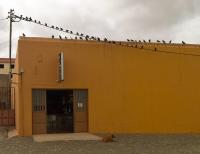 They are stories from which the narrator takes on the ambiguities of the discourses of negritude and whiteness, racism and antiracism, the plasticity of discrimination, the trap of stereotype, and the awareness of prejudice. These are stories that point us to a common past made up of very different memories.
They are stories from which the narrator takes on the ambiguities of the discourses of negritude and whiteness, racism and antiracism, the plasticity of discrimination, the trap of stereotype, and the awareness of prejudice. These are stories that point us to a common past made up of very different memories.
02.10.2018 | by Margarida Calafate Ribeiro
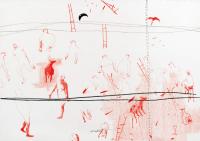 It is a fact: societies forget. Forgetting is a necessary process for creating collective identities, political solidarities and projects of social governance. It plays a role, too, in survival and rebeginning after civil wars or other crises in which societies break down.
It is a fact: societies forget. Forgetting is a necessary process for creating collective identities, political solidarities and projects of social governance. It plays a role, too, in survival and rebeginning after civil wars or other crises in which societies break down.
02.10.2018 | by Hélia Santos
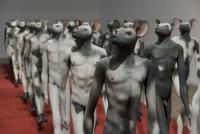 But we can't reverse History, even with the several attempts to naturalize it, to deny it and to manipulate it. Hence the importance of paying attention to the reluctant times we are now living in, which repeatedly insist on following the same old paradigms and refuse to make structural changes.
But we can't reverse History, even with the several attempts to naturalize it, to deny it and to manipulate it. Hence the importance of paying attention to the reluctant times we are now living in, which repeatedly insist on following the same old paradigms and refuse to make structural changes.
22.09.2018 | by Joacine Katar Moreira
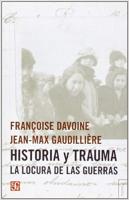 According to the authors themselves, reflecting on the complexity of the dilemma, “what cannot be said cannot be silenced either.” All of us at some point in our lives feel relief when it is possible to share something that affects us. We realize that whoever hears us, in addition to understanding us, validates and legitimizes what we are feeling with their gaze or words, thus confirming that we are not crazy.
According to the authors themselves, reflecting on the complexity of the dilemma, “what cannot be said cannot be silenced either.” All of us at some point in our lives feel relief when it is possible to share something that affects us. We realize that whoever hears us, in addition to understanding us, validates and legitimizes what we are feeling with their gaze or words, thus confirming that we are not crazy.
14.09.2018 | by Ana Tironi
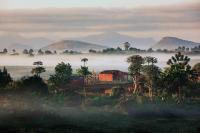 For many young people today, in Cape Verde, Guinea Bissau, Portugal, France, Brazil, the United States of America, Cabral represents the possibility of criticizing various forms of power, of resistance and of affirming their identities. The ways that Cabral has been taken up confirm that the originality of his praxis lies in its articulation of, and opposition to, different dimensions of domination and violence, from neo-colonialism to gender discrimination.
For many young people today, in Cape Verde, Guinea Bissau, Portugal, France, Brazil, the United States of America, Cabral represents the possibility of criticizing various forms of power, of resistance and of affirming their identities. The ways that Cabral has been taken up confirm that the originality of his praxis lies in its articulation of, and opposition to, different dimensions of domination and violence, from neo-colonialism to gender discrimination.
04.08.2018 | by Sílvia Roque
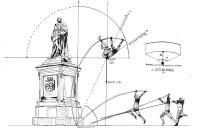 One of the most important discoveries to which the museum of the “Discoveries” could lead would, thus, be the perception that the uses of language are not innocent and the grammar of memory has always much more to do with the present than with the past – the perception, in short, that, in the whole controversy, what is at stake is not simply what we were, but, rather, what we are and, above all, what we want to be.
One of the most important discoveries to which the museum of the “Discoveries” could lead would, thus, be the perception that the uses of language are not innocent and the grammar of memory has always much more to do with the present than with the past – the perception, in short, that, in the whole controversy, what is at stake is not simply what we were, but, rather, what we are and, above all, what we want to be.
14.07.2018 | by António Sousa Ribeiro
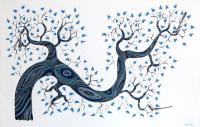 Now, forty-four years after the end of the War, for the former combatants who celebrate it in Belém, June 10 is, above all, a day when those who once fought together in Africa pay tribute to their comrades who died there. This year the meeting was celebrated for the 25th time. The same format unfolded: interfaith ceremony; speeches; a message from the President (in the Azores for other celebrations); parades, a cortège and the laying of flowers. Adriano Moreira did not speak, but he was a guest of honour. This tribute to the war-dead stages the consensus on which the meeting itself has always relied.
Now, forty-four years after the end of the War, for the former combatants who celebrate it in Belém, June 10 is, above all, a day when those who once fought together in Africa pay tribute to their comrades who died there. This year the meeting was celebrated for the 25th time. The same format unfolded: interfaith ceremony; speeches; a message from the President (in the Azores for other celebrations); parades, a cortège and the laying of flowers. Adriano Moreira did not speak, but he was a guest of honour. This tribute to the war-dead stages the consensus on which the meeting itself has always relied.
13.07.2018 | by Fátima da Cruz Rodrigues
 Which colonial or imperial history are we talking about? What do we know about this past, whether distant or recent? What do we really know about such fundamental questions as occupational or income structures in former colonial societies, or patterns of consumption, degrees of literacy, cultural practices, ideological possibilities, levels of political education and participation, or citizenship and land policies, in the city, countryside or in between?
Which colonial or imperial history are we talking about? What do we know about this past, whether distant or recent? What do we really know about such fundamental questions as occupational or income structures in former colonial societies, or patterns of consumption, degrees of literacy, cultural practices, ideological possibilities, levels of political education and participation, or citizenship and land policies, in the city, countryside or in between?
02.06.2018 | by Miguel Bandeira Jerónimo
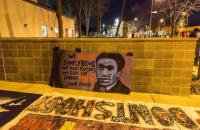 I want to first discuss the politics around teaching Fanon in today’s postcolonial world, and in particular in a post-Brexit Britain. What is it about Fanon that captures the hearts and minds of so many students, particularly students of colour? I then want to discuss the continuing debate around Fanon’s relationship to Marxism, looking at some of the ways in which Fanon’s work provides a refreshing lens on capitalism in the postcolonial world.
I want to first discuss the politics around teaching Fanon in today’s postcolonial world, and in particular in a post-Brexit Britain. What is it about Fanon that captures the hearts and minds of so many students, particularly students of colour? I then want to discuss the continuing debate around Fanon’s relationship to Marxism, looking at some of the ways in which Fanon’s work provides a refreshing lens on capitalism in the postcolonial world.
20.08.2017 | by Sara Salem
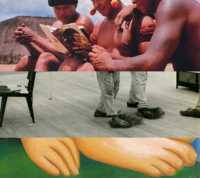 Art has always been able to gather critical tools of action from different contexts of knowledge in order to intervene in institutions, politics, and social problems. This makes it a privileged place to find new strategies for empistemodiversity. At the same time, art has always maintained a strict border between itself and popular culture, to ensure that art is on the same level as the Western sciences. What if this border disappeared? How do we construct a new language that uses popular knowledge not as a theme for contemporary art, but as a spark for creating new regimes of representation and new structures of thought? How can contemporary art contribute to the learning of epistemodiversity?
Art has always been able to gather critical tools of action from different contexts of knowledge in order to intervene in institutions, politics, and social problems. This makes it a privileged place to find new strategies for empistemodiversity. At the same time, art has always maintained a strict border between itself and popular culture, to ensure that art is on the same level as the Western sciences. What if this border disappeared? How do we construct a new language that uses popular knowledge not as a theme for contemporary art, but as a spark for creating new regimes of representation and new structures of thought? How can contemporary art contribute to the learning of epistemodiversity?
10.10.2016 | by María Iñigo Clavo
 Simone was able to conjure glamour in spite of everything the world said about black women who looked like her. And for that she enjoyed a special place in the pantheon of resistance. That fact doesn’t just have to do with her lyrics or her musicianship, but also how she looked. Simone is something more than a female Bob Marley. It is not simply the voice: It is the world that made that voice, all the hurt and pain of denigration, forged into something otherworldly.
Simone was able to conjure glamour in spite of everything the world said about black women who looked like her. And for that she enjoyed a special place in the pantheon of resistance. That fact doesn’t just have to do with her lyrics or her musicianship, but also how she looked. Simone is something more than a female Bob Marley. It is not simply the voice: It is the world that made that voice, all the hurt and pain of denigration, forged into something otherworldly.
23.03.2016 | by Ta-Nehisi Coates
 Their story becomes the usual story of many immigrants coming from the old colonies in search of medical treatment or of a better life. In Angola, Cartola was a midwife. In Lisbon, he became a construction janitor, and the city made him indecisive and gloomy. Aquiles, who was still a teenager when he switched country, no longer felt Angolan.
Their story becomes the usual story of many immigrants coming from the old colonies in search of medical treatment or of a better life. In Angola, Cartola was a midwife. In Lisbon, he became a construction janitor, and the city made him indecisive and gloomy. Aquiles, who was still a teenager when he switched country, no longer felt Angolan.  brain drain is a problem. Emigration in Cape Verde is not a bed of roses. In fact, it has created a serious problem of brain drain. One common situation involves young students who decide to study abroad (in Portugal, for example) and do not return to Cape Verde after completion of their university education. According to data between 1997/98 and 2002/2003, about 77% of students (around 5,382) left the country and did not return.
brain drain is a problem. Emigration in Cape Verde is not a bed of roses. In fact, it has created a serious problem of brain drain. One common situation involves young students who decide to study abroad (in Portugal, for example) and do not return to Cape Verde after completion of their university education. According to data between 1997/98 and 2002/2003, about 77% of students (around 5,382) left the country and did not return.  They arrived in Angola 100 years ago. They witnessed the decline of a colonial power that instrumentalized them and the birth of the Angolan nation. The memory of Cape-Verdean immigrants in our country tells a story of oppression and resistance that the creole sociologist Nardi Sousa salvaged and is to publish in a book.
They arrived in Angola 100 years ago. They witnessed the decline of a colonial power that instrumentalized them and the birth of the Angolan nation. The memory of Cape-Verdean immigrants in our country tells a story of oppression and resistance that the creole sociologist Nardi Sousa salvaged and is to publish in a book.  Cape Verde is not Africa, Cape Verdeans are “special blacks” and the closest to Portugal. Cape Verde is the country of miscegenation, the “proof” of “racial harmony” of Luso-Tropicalism. For many years, this was the dominant narrative. To be or not to be African continues to be a question.
Cape Verde is not Africa, Cape Verdeans are “special blacks” and the closest to Portugal. Cape Verde is the country of miscegenation, the “proof” of “racial harmony” of Luso-Tropicalism. For many years, this was the dominant narrative. To be or not to be African continues to be a question.  In Cape Verde, the sandwich is not making significant inroads. It continues to be foreign, prepared fresh and appreciated by tourists and in a restricted circle of young middle-class professionals. This must be understood within the social and economic context. The following discusses whether or not the sandwich stands a chance in the Atlantic. It looks at the history and current development of Cape Verde, focuses on food issues, and explores how the sandwich fits in.
In Cape Verde, the sandwich is not making significant inroads. It continues to be foreign, prepared fresh and appreciated by tourists and in a restricted circle of young middle-class professionals. This must be understood within the social and economic context. The following discusses whether or not the sandwich stands a chance in the Atlantic. It looks at the history and current development of Cape Verde, focuses on food issues, and explores how the sandwich fits in.  On the contrary, myth derives from oral traditions and has its roots in the fantastic. At the same time, although myth does not need reality to acquire meaning, it does maintain some contact with experience and the world, as a kind of reality-in-disguise.
On the contrary, myth derives from oral traditions and has its roots in the fantastic. At the same time, although myth does not need reality to acquire meaning, it does maintain some contact with experience and the world, as a kind of reality-in-disguise.  When history and duties to memory are ignored, truth can easily be thought of as a personal choice. Once accommodated in powerful discourse, these “truths” assume impunity: often disregarded and rarely condemned, even though they represent hate speech. Hatred has been normalized and has propelled a radicalism in which “good” struggles against “evil.” In this dichotomy, evil is once again the ‘other’. A discourse that does not humanize the ‘other’ authorizes barbarism – as we have seen in the post-election reactions
When history and duties to memory are ignored, truth can easily be thought of as a personal choice. Once accommodated in powerful discourse, these “truths” assume impunity: often disregarded and rarely condemned, even though they represent hate speech. Hatred has been normalized and has propelled a radicalism in which “good” struggles against “evil.” In this dichotomy, evil is once again the ‘other’. A discourse that does not humanize the ‘other’ authorizes barbarism – as we have seen in the post-election reactions  The societies in which we live at different latitudes are legacies of colonialism and constituted by imperial ruins. Depending on our skin colour, social class, academic background and where we live, we can inherit privilege – by benefitting directly or indirectly from the wealth European exploration accumulated – or we can inherit, even accumulate, the oppression of institutional racism and be exposed to inequality and racist colonial violence.
The societies in which we live at different latitudes are legacies of colonialism and constituted by imperial ruins. Depending on our skin colour, social class, academic background and where we live, we can inherit privilege – by benefitting directly or indirectly from the wealth European exploration accumulated – or we can inherit, even accumulate, the oppression of institutional racism and be exposed to inequality and racist colonial violence.  Ana Maria Garcia Nolasco da Silva
Member of the Research Unit in Design and Communication (UNIDCOM) of the Creative University of Lisbon (IADE-U) and of the Centre for Comparative Studies (CEC) of the University of Lisbon.
analascosapopt@gmail.com
In the same way each re-invents his own childhood by creating a narrative – one out of many possible others – with which he identifies in the present moment, so can it be said that national identities are continuously created retroactively though discourse, of which their citizens are active participants.
Ana Maria Garcia Nolasco da Silva
Member of the Research Unit in Design and Communication (UNIDCOM) of the Creative University of Lisbon (IADE-U) and of the Centre for Comparative Studies (CEC) of the University of Lisbon.
analascosapopt@gmail.com
In the same way each re-invents his own childhood by creating a narrative – one out of many possible others – with which he identifies in the present moment, so can it be said that national identities are continuously created retroactively though discourse, of which their citizens are active participants.  They are stories from which the narrator takes on the ambiguities of the discourses of negritude and whiteness, racism and antiracism, the plasticity of discrimination, the trap of stereotype, and the awareness of prejudice. These are stories that point us to a common past made up of very different memories.
They are stories from which the narrator takes on the ambiguities of the discourses of negritude and whiteness, racism and antiracism, the plasticity of discrimination, the trap of stereotype, and the awareness of prejudice. These are stories that point us to a common past made up of very different memories.  It is a fact: societies forget. Forgetting is a necessary process for creating collective identities, political solidarities and projects of social governance. It plays a role, too, in survival and rebeginning after civil wars or other crises in which societies break down.
It is a fact: societies forget. Forgetting is a necessary process for creating collective identities, political solidarities and projects of social governance. It plays a role, too, in survival and rebeginning after civil wars or other crises in which societies break down.  But we can't reverse History, even with the several attempts to naturalize it, to deny it and to manipulate it. Hence the importance of paying attention to the reluctant times we are now living in, which repeatedly insist on following the same old paradigms and refuse to make structural changes.
But we can't reverse History, even with the several attempts to naturalize it, to deny it and to manipulate it. Hence the importance of paying attention to the reluctant times we are now living in, which repeatedly insist on following the same old paradigms and refuse to make structural changes.  According to the authors themselves, reflecting on the complexity of the dilemma, “what cannot be said cannot be silenced either.” All of us at some point in our lives feel relief when it is possible to share something that affects us. We realize that whoever hears us, in addition to understanding us, validates and legitimizes what we are feeling with their gaze or words, thus confirming that we are not crazy.
According to the authors themselves, reflecting on the complexity of the dilemma, “what cannot be said cannot be silenced either.” All of us at some point in our lives feel relief when it is possible to share something that affects us. We realize that whoever hears us, in addition to understanding us, validates and legitimizes what we are feeling with their gaze or words, thus confirming that we are not crazy.  For many young people today, in Cape Verde, Guinea Bissau, Portugal, France, Brazil, the United States of America, Cabral represents the possibility of criticizing various forms of power, of resistance and of affirming their identities. The ways that Cabral has been taken up confirm that the originality of his praxis lies in its articulation of, and opposition to, different dimensions of domination and violence, from neo-colonialism to gender discrimination.
For many young people today, in Cape Verde, Guinea Bissau, Portugal, France, Brazil, the United States of America, Cabral represents the possibility of criticizing various forms of power, of resistance and of affirming their identities. The ways that Cabral has been taken up confirm that the originality of his praxis lies in its articulation of, and opposition to, different dimensions of domination and violence, from neo-colonialism to gender discrimination.  One of the most important discoveries to which the museum of the “Discoveries” could lead would, thus, be the perception that the uses of language are not innocent and the grammar of memory has always much more to do with the present than with the past – the perception, in short, that, in the whole controversy, what is at stake is not simply what we were, but, rather, what we are and, above all, what we want to be.
One of the most important discoveries to which the museum of the “Discoveries” could lead would, thus, be the perception that the uses of language are not innocent and the grammar of memory has always much more to do with the present than with the past – the perception, in short, that, in the whole controversy, what is at stake is not simply what we were, but, rather, what we are and, above all, what we want to be.  Now, forty-four years after the end of the War, for the former combatants who celebrate it in Belém, June 10 is, above all, a day when those who once fought together in Africa pay tribute to their comrades who died there. This year the meeting was celebrated for the 25th time. The same format unfolded: interfaith ceremony; speeches; a message from the President (in the Azores for other celebrations); parades, a cortège and the laying of flowers. Adriano Moreira did not speak, but he was a guest of honour. This tribute to the war-dead stages the consensus on which the meeting itself has always relied.
Now, forty-four years after the end of the War, for the former combatants who celebrate it in Belém, June 10 is, above all, a day when those who once fought together in Africa pay tribute to their comrades who died there. This year the meeting was celebrated for the 25th time. The same format unfolded: interfaith ceremony; speeches; a message from the President (in the Azores for other celebrations); parades, a cortège and the laying of flowers. Adriano Moreira did not speak, but he was a guest of honour. This tribute to the war-dead stages the consensus on which the meeting itself has always relied.  Which colonial or imperial history are we talking about? What do we know about this past, whether distant or recent? What do we really know about such fundamental questions as occupational or income structures in former colonial societies, or patterns of consumption, degrees of literacy, cultural practices, ideological possibilities, levels of political education and participation, or citizenship and land policies, in the city, countryside or in between?
Which colonial or imperial history are we talking about? What do we know about this past, whether distant or recent? What do we really know about such fundamental questions as occupational or income structures in former colonial societies, or patterns of consumption, degrees of literacy, cultural practices, ideological possibilities, levels of political education and participation, or citizenship and land policies, in the city, countryside or in between?  I want to first discuss the politics around teaching Fanon in today’s postcolonial world, and in particular in a post-Brexit Britain. What is it about Fanon that captures the hearts and minds of so many students, particularly students of colour? I then want to discuss the continuing debate around Fanon’s relationship to Marxism, looking at some of the ways in which Fanon’s work provides a refreshing lens on capitalism in the postcolonial world.
I want to first discuss the politics around teaching Fanon in today’s postcolonial world, and in particular in a post-Brexit Britain. What is it about Fanon that captures the hearts and minds of so many students, particularly students of colour? I then want to discuss the continuing debate around Fanon’s relationship to Marxism, looking at some of the ways in which Fanon’s work provides a refreshing lens on capitalism in the postcolonial world.  Art has always been able to gather critical tools of action from different contexts of knowledge in order to intervene in institutions, politics, and social problems. This makes it a privileged place to find new strategies for empistemodiversity. At the same time, art has always maintained a strict border between itself and popular culture, to ensure that art is on the same level as the Western sciences. What if this border disappeared? How do we construct a new language that uses popular knowledge not as a theme for contemporary art, but as a spark for creating new regimes of representation and new structures of thought? How can contemporary art contribute to the learning of epistemodiversity?
Art has always been able to gather critical tools of action from different contexts of knowledge in order to intervene in institutions, politics, and social problems. This makes it a privileged place to find new strategies for empistemodiversity. At the same time, art has always maintained a strict border between itself and popular culture, to ensure that art is on the same level as the Western sciences. What if this border disappeared? How do we construct a new language that uses popular knowledge not as a theme for contemporary art, but as a spark for creating new regimes of representation and new structures of thought? How can contemporary art contribute to the learning of epistemodiversity?  Simone was able to conjure glamour in spite of everything the world said about black women who looked like her. And for that she enjoyed a special place in the pantheon of resistance. That fact doesn’t just have to do with her lyrics or her musicianship, but also how she looked. Simone is something more than a female Bob Marley. It is not simply the voice: It is the world that made that voice, all the hurt and pain of denigration, forged into something otherworldly.
Simone was able to conjure glamour in spite of everything the world said about black women who looked like her. And for that she enjoyed a special place in the pantheon of resistance. That fact doesn’t just have to do with her lyrics or her musicianship, but also how she looked. Simone is something more than a female Bob Marley. It is not simply the voice: It is the world that made that voice, all the hurt and pain of denigration, forged into something otherworldly. 